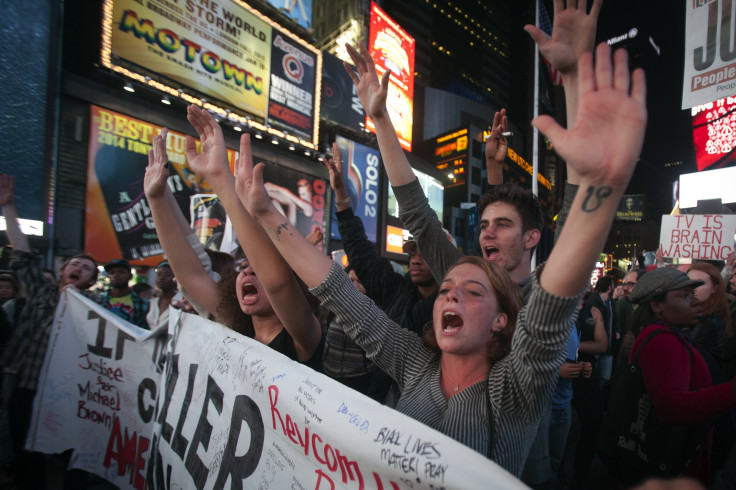From Chelsea To Harlem, Mike Brown Outrage Rings
Hundreds Claim New York Streets After Controversial Ferguson Verdict

“I lived through the 60’s and this is the 60’s incarnate,” says Ursula Davis, standing near the Harlem entrance to Interstate 278. Davis has been marching since 96th Street. Others in the crowd of hundreds, protesting the Ferguson grand jury decision not to indict Officer Darren Wilson for the shooting death of Michael Brown, have been marching since 14th Street.
They are weary, and not just from the long trek through Manhattan. “People are very disappointed in our criminal justice system,” Davis explains. A system that is supposed to give people hope has failed them.
It’s a peaceful night, a temperate one. For the hundreds in attendance, it is full of spikes in spirit: a sympathetic car horn sends a roar up to the sky; the arrival of the crowd in Harlem lends new energy and calls of “Join us sister” and “Join us brother” go out to curious onlookers.
But, the recurring mantra, “Black lives matter,” is a stark reminder that this crowd isn’t just out to enjoy a November night. “F*** the police,” is an even starker reminder that an existential struggle is at hand.
This just might be the image of the night, folks. #Ferguson #NYC #blacklivesmatter pic.twitter.com/4Vl9kSoVgM
- Daisy Alioto (@daisandconfused) November 25, 2014“I wouldn’t want to raise a black or Latino male child today,” says Davis who was born and raised in Harlem. “Little boys grow up in the city afraid.”
Little boys like Brian Campos, also raised in Harlem, who now lives nearby and came to stand with the crowd assembled at the Interstate ramp. Part of the crowd has gone ahead onto the Interstate to the disapproval of NYPD officers, who after leading the protesters through largely cleared streets now stand in a formation of dozens facing them.
“They think we’re all threats,” says Campos softly. He doesn’t have much hope that stereotypes will change. “It’ll cool down until the next time it happens… it’s just a never ending cycle.” ‘It’ being the press coverage surrounding Michael Brown, and before that Jordan Davis, and before that Trayvon Martin.
To Pedro Vasquez, the wrongs against (mainly young) minority men are a veritable laundry list of proof that “the system is flawed," that it’s “skewed against people of color."
He brings up Tamir Rice and Eric Garner to illustrate his point. Vasquez has lived in New York for three months, moving from the Orlando area near where Trayvon Martin was shot by George Zimmerman, who was later acquitted.
Vasquez also compares the four months he spent in jail for driving with a suspended license to the fate of Ethan Couch -- a white Texas teen who killed four in a drunk-driving incident and will serve 10 years probation. Couch’s defense expert argued “affluenza” was at the root of his behavior -- he was too privileged.
Vasquez couldn’t afford more than a public defender. “I saw people with domestic violence [charges] doing less time than me.”
NYPD is drawing a clear boundary. The entrance to the Interstate elicits the most tension that there has been along the entire route between the crowd and the police.
“Am I in Ferguson?” a middle-aged black woman asks as she edges toward the ramp. “Is this Ferguson, Manhattan?!” The crowd snickers. NYPD grab her by the shoulders to move her away from the blockaded highway and the crowd surges forward in anger.
When the scene clears it is NYPD on one side of a black metal fence, demonstrators on the other. One protester is carried to a police car. It is the only action resembling an arrest that this reporter witnessed.
“Who do you serve?” goes one angry cry. It's after midnight. Everyone looks some sort of tired.
“My hope is that America looks in the mirror and sees its own reflection,” says Davis. “This is everybody’s issue.”
"New York is Ferguson, Ferguson is New York!" https://t.co/lVT8JRSiwf
- IBTimes (@IBTimes) November 25, 2014© Copyright IBTimes 2024. All rights reserved.






















